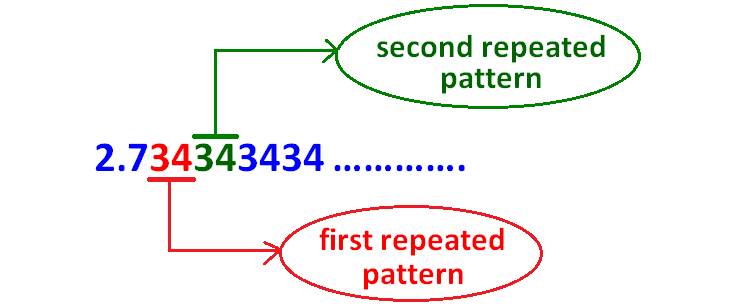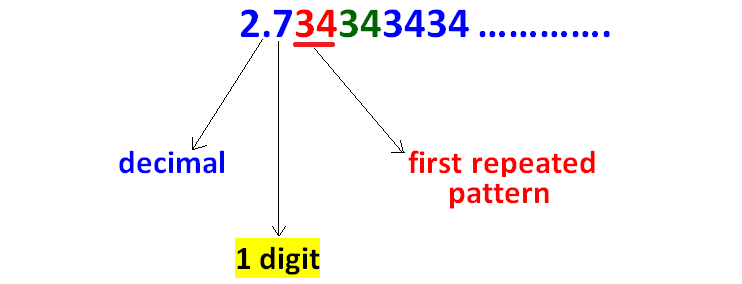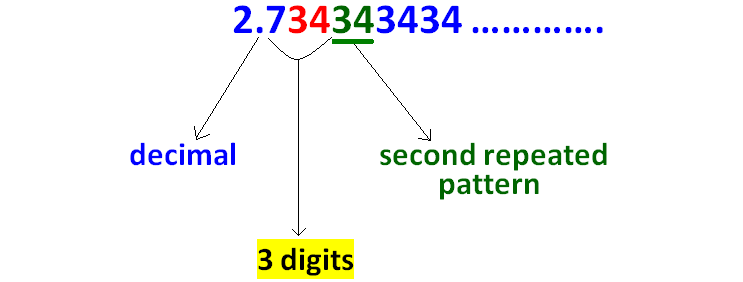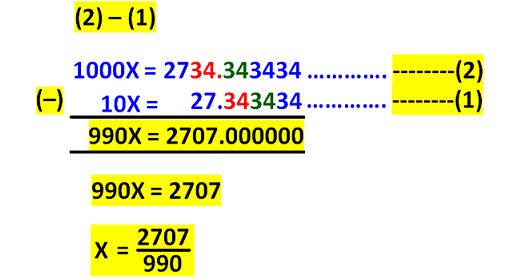CONVERTING RECURRING DECIMALS TO FRACTIONS
Subscribe to our ▶️ YouTube channel 🔴 for the latest videos, updates, and tips.
How to convert recurring decimals to fractions :
Step 1 :
Let x be the given decimal number.
For example, x = 2.7343434..............
Step 2 :
Identify the repeated pattern
In 2.7343434..........., the repeated pattern is 34
(Because 34 is being repeated)
Step 3 :
Identify the first repeated pattern and second repeated pattern as shown below.

Step 4 :
Count the number of digits between the decimal point and first repeated pattern as shown below.

Step 5 :
Because there is one digit between the decimal point and the first repeated pattern, we have to multiply the given decimal by 10.
(If there are two digits, multiply by 100, three digits, multiply by 1000 and so on)
x = 2.734343434....................
10x = 10(2.734343434....................)
10x = 27.34343434....................----(1)
Note :
In (1), we have only repeated patterns after the decimal.
Step 6 :
Count the number of digits between the decimal point and second repeated pattern as shown below.

Step 7 :
Because there are three digits between the decimal point and the second repeated pattern, we have to multiply the given decimal by 1000.
x = 2.734343434....................
1000x = 1000(2.734343434....................)
1000x = 2734.343434....................----(2)
Note :
In (2), we have only repeated patterns after the decimal.
Step 8 :
Subtract the result of step 5 from step 7.

So,
2.7343434.............. = 2707/990
Solved Problems
Covert the recurring decimals to fractions :
Problem 1 :
32.03256256256..........
Solution :
Let x = 32.03256256256.............
The repeated pattern is 256.
There are two digits between the decimal point and 1st repeated pattern, that is 03.
Multiply the given decimal number by 100.
100x = 3203.256256256...............-----(1)
There are five digits between the decimal point and the 2nd repeated pattern, that is 03256.
Multiply the given decimal number by 100000.
100000x = 3203256.256256256...............-----(2)
Subtract (1) from (2).
99900x = 3200053
x = 3200053/99900
32.03256256256.......... = 3200053/99900
Problem 2 :
0.01232222........
Solution :
Let x = 0.01232222.............
The repeated pattern is 2.
There are four digits between the decimal point and 1st repeated pattern, that is 0123.
Multiply the given decimal number by 10000.
10000x = 123.2222...............-----(1)
There are five digits between the decimal point and the 2nd repeated pattern, that is 01232.
Multiply the given decimal number by 100000.
100000x = 1232.2222...............-----(2)
Subtract (1) from (2).
90000x = 1109
x = 1109/90000
0.01232222........... = 1109/90000
Problem 3 :
2.03323232..........
Solution :
Let x = 2.03323232.............
The repeated pattern is 32.
There are two digits between the decimal point and 1st repeated pattern, that is 03.
Multiply the given decimal number by 100.
100x = 203.323232...............-----(1)
There are four digits between the decimal point and the 2nd repeated pattern, that is 0332.
Multiply the given decimal number by 10000.
10000x = 20332.323232...............-----(2)
Subtract (1) from (2).
9900x = 20129
x = 9900/20129
2.03323232.......... = 9900/20129
Problem 4 :
0.252525..........
Solution :
Let x = 0.252525.............
The repeated pattern is 25.
There is no digit between the decimal point and 1st repeated pattern.
x = 0.252525...............-----(1)
There are two digits between the decimal point and the 2nd repeated pattern, that is 25.
Multiply the given decimal number by 100.
100x = 25.252525...............-----(2)
Subtract (1) from (2).
99x = 25
x = 25/99
0.252525.......... = 25/99
Problem 5 :
3.3333..........
Solution :
Let x = 3.3333.............
The repeated pattern is 3.
There is no digit between the decimal point and 1st repeated pattern.
x = 3.3333...............-----(1)
There is one digit between the decimal point and the 2nd repeated pattern, that is 3.
Multiply the given decimal number by 10.
10x = 33.3333...............-----(2)
Subtract (1) from (2).
9x = 30
x = 30/9
x = 10/3
3.3333.............. = 10/3
Problem 6 :
1.023562562562..........
Solution :
Let x = 1.023562562562.............
The repeated pattern is 562.
There are three digits between the decimal point and 1st repeated pattern, that is 023.
Multiply the given decimal number by 1000.
1000x = 1023.562562562...............-----(1)
There are six digits between the decimal point and the 2nd repeated pattern, that is 023562.
Multiply the given decimal number by 1000000.
1000000x = 1023562.562562562...............-----(2)
Subtract (1) from (2).
999000x = 1022538
x = 1022539/999000
1.023562562562.......... = 1022539/999000
Subscribe to our ▶️ YouTube channel 🔴 for the latest videos, updates, and tips.
Kindly mail your feedback to v4formath@gmail.com
We always appreciate your feedback.
About Us | Contact Us | Privacy Policy
©All rights reserved. onlinemath4all.com

Recent Articles
-
Digital SAT Math Problems and Solutions (Part - 41)
Mar 04, 26 04:23 AM
Digital SAT Math Problems and Solutions (Part - 41) -
Digital SAT Math Problems and Solutions (Part - 40)
Mar 03, 26 06:53 PM
Digital SAT Math Problems and Solutions (Part - 40) -
Digital SAT Math Problems and Solutions (Part - 39)
Mar 03, 26 04:59 PM
Digital SAT Math Problems and Solutions (Part - 39)


